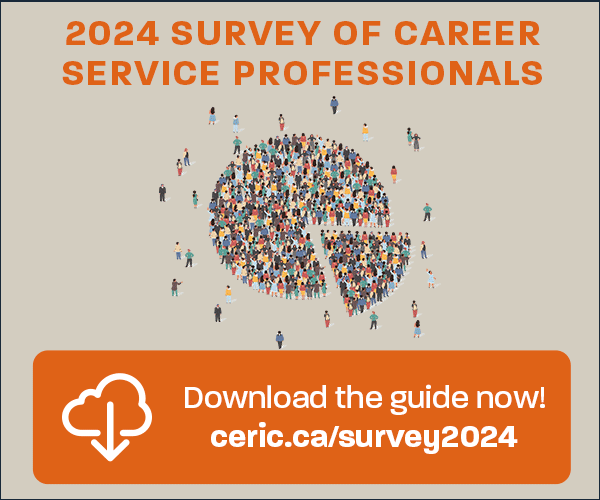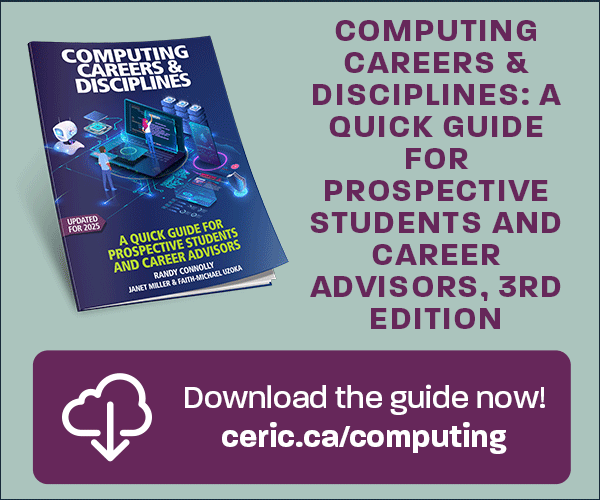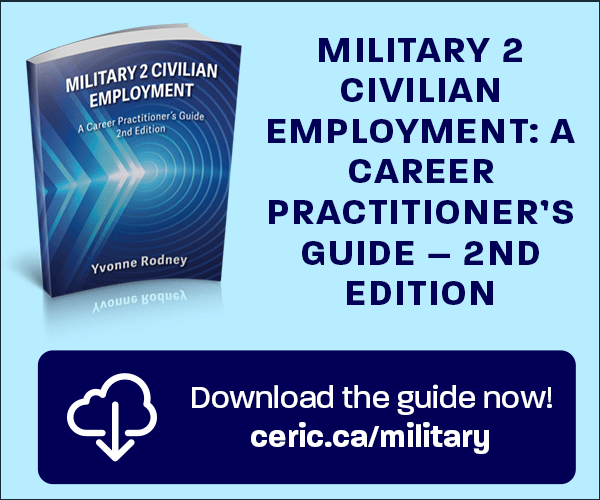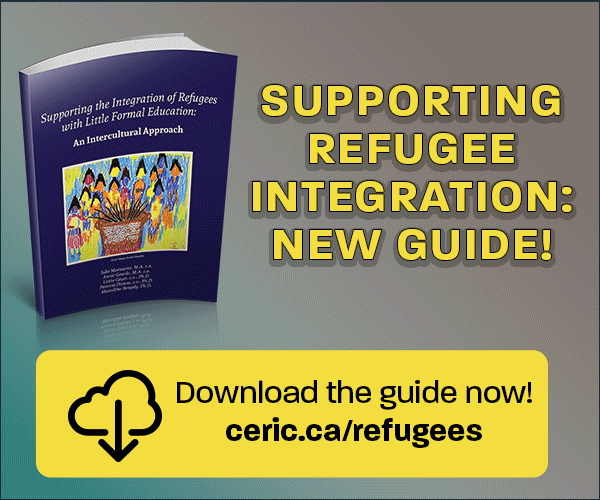Fostering Graduate Student Engagement for the Future of Career Development
DOI:
https://doi.org/10.53379/cjcd.2023.381Keywords:
Graduate students, Student engagement, Engagement programs, Mentorship, Career research, Career developmentAbstract
This article addresses the challenges faced by graduate students throughout their academic journeys and highlights the pivotal role of organizations such as CERIC in enriching their experiences through active engagement, mentorship, and fostering a sense of connection and belonging. It emphasizes the significance of engagement programs, specifically focusing on the Graduate Student Engagement Program (GSEP). The GSEP offers valuable opportunities for graduate students to connect with peers and experts in their field, fostering an environment conducive to sharing experiences, exchanging knowledge, and building professional networks. GSEP serves as a platform for graduate students to showcase their work and research outcomes, receive constructive feedback, and actively contribute to a vibrant community of scholars. By acknowledging and supporting the unique needs of graduate students, organizations and engagement programs play a vital role in empowering the next generation of researchers and practitioners in career development.
References
Antony, J. S. (2002). Reexamining doctoral student socialization and professional development: Moving beyond the congruence and assimilation orientation. In J. C. Smart, & W. G. Tierney (Eds.), Higher Education: Handbook of Theory and Research, 17 (pp. 349-380). Springer.
Balakrishnan, B., Prakash Krishnan Muthaiah, V., Peters-Brinkerhoff, C. & Ganesan, M. (2023). Stress, anxiety, and depression in professional graduate students during COVID 19 pandemic. Educational and Developmental Psychologist, 40(2), 201-213. https://doi.org/10.1080/20590776.2022.2114341
Bennett, D., Knight, E., Jevons, C., & Ananthram, S. (2020). Business students’ thinking about their studies and future careers. Perspectives: Policy and Practice in Higher Education, 24(3), 96-101. https://doi.org/10.1080/13603108.2020.1757530
Berdahl, L. (2022). Empowering doctoral students – and other universities. University Affairs. https://www.universityaffairs.ca/career-advice/the-skills-agenda/empowering-doctoral-students-and-other-universities/
Byrnes, D., Uribe-Florez, L. J., Trespalacios, J., & Chilson, J. (2019). Doctoral e-mentoring: Current practices and effective strategies. Online Learning Journal [OLJ], 23(1), 236+. https://doi.org/10.24059/olj.v23i1.1446
Canadian Association for Graduate Studies. (2004). The Completion of Graduate Studies in Canadian Universities: Report & Recommendations. https://cags.ca/documents/publications/working/completion_grad_studies_2004.pdf
Canadian Association for Graduate Studies. (2019). Canadian Graduate and Professional Student Survey. https://ozza2b.p3cdn1.secureserver.net/wp-content/uploads/2020/08/NATIONAL_CGPSS_2019_ALL.pdf
Canadian University Survey Consortium (2021). 2021 Graduating Student Survey Master Report. https://cusc-ccreu.ca/wordpress/?page_id=32&lang=en
Carini, R. M. (2012). Engagement in learning. In N. M. Seel (Ed.), Encyclopedia of the Sciences of Learning. Springer, Boston, MA. https://doi.org/10.1007/978-1-4419-1428-6_1006
Celinski, H. (2022). Legacy learning and career development: Higher education students as agents of change. CERIC. https://ceric.ca/2022/06/legacy-learning-and-career-development-higher-education-students-as-agents-of-change/
CERIC (2021). Career development in the Canadian workplace: National business survey. CERIC. https://ceric.ca/surveys/career-development-in-the-canadian-workplace-national-business-survey-2021/
Cheng, S. (2023). Harnessing the power of storytelling for mature international graduate students. University Affairs. https://www.universityaffairs.ca/career-advice/global-campus/harnessing-the-power-of-storytelling-for-mature-international-graduate-students/
Chi, T., Cheng, L. & Zhang, Z. (2023). Global prevalence and trend of anxiety among graduate students: A systematic review and meta-analysis. Brain and Behavior, 13(4), 1-16. https://doi.org/10.1002/brb3.2909
Dey, F., & Cruzvergara, C. Y. (2014). Evolution of career services in higher education. New Directions for Student Services, 2014 (148), 5-18. https://doi.org/10.1002/ss.20105
Elgar, F. (2003). PhD Completion in Canadian Universities: Final Report. https://www.researchgate.net/publication/236595361_PhD_Degree_Completion_in_Canadian_Universities_Final_Report
Express Employment Professionals (2023). Graduating Class of 2023 in Demand: Job prospects for grads at highest level in years. https://www.globenewswire.com/en/news-release/2023/04/26/2655164/0/en/Graduating-Class-of-2023-In-Demand-Job-Prospects-for-Grads-at-Highest-Level-in-Years.html
Gardner, S., & Barnes, B. (2007). Graduate student involvement: Socialization for the professional role. Journal of College Student Development, 48(4), 369-387. https://muse.jhu.edu/article/218933
Giannone, Z. A., Gagnon, M. M., & Ko, H. C. H. (2018). Mentorship as a career intervention: An evaluation of a peer-mentoring program with Canadian university psychology students. Canadian Journal of Career Development, 17(2), 4-24. https://cjcd-rcdc.ceric.ca/index.php/cjcd/article/view/76/95
Ginting, D. (2021). Student engagement and factors affecting active learning in English language teaching. VELES Voices of English Language Education Society, 5(2), 215-228. http://dx.doi.org/10.29408/veles.v5i2.3968
Gismondi, M. (2021). Why universities are failing to prepare students for the job market. CBC. https://www.cbc.ca/radio/ideas/why-universities-are-failing-to-prepare-students-for-the-job-market-1.6208196
Golde, C. M. (2000). Should I stay or should I go? Student descriptions of the doctoral attrition process. The Review of Higher Education, 23(2), 199-227. https://muse.jhu.edu/article/30095
Greene, M. J. (2013). Transitioning into, through, and out of graduate school: A theoretical Model. Canadian Journal of Career Development, 12(1), 49-57. https://cjcd-rcdc.ceric.ca/index.php/cjcd/article/view/208
Healy, M. (2021). Careers and employability learning: pedagogical principles for higher education. Studies in Higher Education, ahead-of-print. https://doi.org/10.1080/03075079.2023.2196997
Ho, C. (2019). Professionals in post-secondary education: Conceptions of career influence [Doctoral dissertation]. Simon Fraser University. http://summit.sfu.ca/item/18827
Jackson, D., & Michelson, G. (2015). Factors influencing the employment of Australian PhD graduates. Studies in Higher Education, 40(9), 1660- 1678. https://doi.org/10.1080/03075079.2014.899344
Jaschik, S., & Lederman, S. (2023) 2023 Survey of College and University Presidents. Inside Higher Ed and Hanover Research. https://www.insidehighered.com/reports/2023/04/10/2023-survey-college-and-university-presidents
Jensen, D. H., & Jetten, J. (2016). The importance of developing students’ academic and professional identities in higher education. Journal of College Student Development 57(8), 1027-1042. https://doi.org/10.1353/csd.2016.0097
Jones, N., Torezani, S., & Luca, J. (2012). A peer-to-peer support model for developing graduate students’ career and employability skills. Intercultural Education 23(1), 51-62. https://doi.org/10.1080/14675986.2012.664754
Kuh, G. D. (2003). What we’re learning about student engagement from NSSE: Benchmarks for effective educational practices. Change: The Magazine of Higher Learning, 35(2), 24-32. https://doi.org/10.1080/00091380309604090
Kuh, G. D. (2009). What student affairs professionals need to know about student engagement. Journal of College Student Development, 50(6), 683-706. https://doi.org/10.1353/csd.0.0099
Leger (2023). The Future of Education in Canada Survey. https://leger360.com/surveys/the-future-of-education-in-canada/
Lehker, T., & Furlong, J. S. (2006). Career services for graduate and professional students. New Directions for Student Services, 2006(115), 73-83. https://doi.org/10.1002/ss.217
Lowery, K., Geesa, R., & McConnelle, K. (2018). Designing a peer-mentoring program for education doctorate (EdD) students. Higher Learning Research Communications, 8(1), 30-50. http://doi.org/10.18870/hlrc.v8i1.408
Malloy, J., & Berdahl, L. (2019). PhD students should prepare for careers beyond becoming professors. The Conversation. https://theconversation.com/phd-students-should-prepare-for-careers-beyond-becoming-professors-123328
Maymon, R. (2023). Why PhDs should consider the labour market when exploring careers. University Affairs. https://www.universityaffairs.ca/career-advice/responsibilities-may-include/why-phds-should-consider-the-labour-market-when-exploring-careers/
Murdock, J. L., Stipanovic, N., & Lucan, K. (2013). Fostering connections between graduate students and strengthening professional identity through co-mentoring. British Journal of Guidance & Counselling, 41(5), 487-503. https://doi.org/10.1080/03069885.2012.756972
Pham, T. (2023). What really contributes to employability of PhD graduates in uncertain labour markets? Globalisation, Societies and Education, ahead-of-print. https://doi.org/10.1080/14767724.2023.2192908
Pollard, R., & Kumar, S. (2021). Mentoring graduate students online: Strategies and challenges. The International Review of Research in Open and Distributed Learning, 22(2), 267-284. https://doi.org/10.19173/irrodl.v22i2.5093
Reddick, R. J., Griffin, K. A., Cherwitz, R. A., Cerda-Prazak, A. A., & Bunch, N. (2012). What you get when you give: How graduate students benefit from serving as mentors. The Journal of Faculty Development, 26(1), 37-49. https://www.ingentaconnect.com/contentone/magna/jfd/2012/00000026/00000001/art00005
Thiry, H., Laursen, S. L., & Loshbaugh, H. G. (2015). “How do I get from here to there?” An examination of Ph.D science students’ career preparation and decision making. International Journal of Doctoral Studies, 10, 237-256. http://doi.org/10.28945/2280
Tomlinson, M., & Jackson, D. (2019). Professional identity formation in contemporary higher education students. Studies in Higher Education, 46(4), 885-900. https://doi.org/10.1080/03075079.2019.1659763
Torunczyn Schein, D. R. (2019). The PhD employment crisis is systemic. Policy Options. https://policyoptions.irpp.org/magazines/july-2019/the-phd-employment-crisis-is-systemic/
Trowler, V. (2010). Student Engagement Literature Review. The Higher Education Academy. https://www.researchgate.net/publication/322342119_Student_Engagement_Literature_Review
Watkins, E. K. (2019). How can today’s students be future-ready? CERIC, CareerWise. https://careerwise.ceric.ca/2019/12/09/how-can-todays-students-be-future-ready/#.ZC3FsXbMJD9
Wetcher, A. (2021). How students are navigating changes in career plans. Inside Higher Ed. https://www.insidehighered.com/views/2021/10/20/career-centers-must-support-students-when-goals-change-opinion
Wong, J. (February 2022). Unhappy with virtual campus life, some students hit pause on school to find new momentum. CBC News. https://www.cbc.ca/news/canada/post-secondary-pause-gap-year-1.6363866

Downloads
Published
How to Cite
Issue
Section
License
Copyright (c) 2023 Canadian Journal of Career Development

This work is licensed under a Creative Commons Attribution-NonCommercial-NoDerivatives 4.0 International License.
















